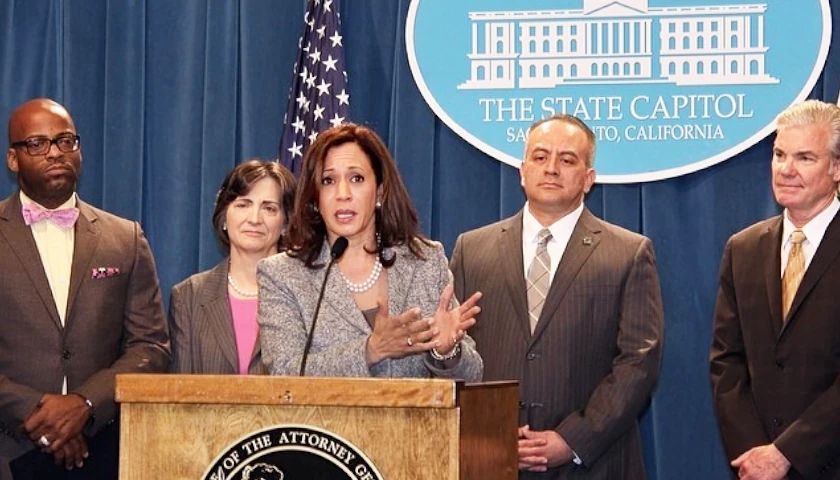by Ja’Ron Smith
The American people deserve to hear from Vice President Kamala Harris about how she plans to rectify the failures of her past decisions.
Does she still stand by her defiance of the court orders that worsened California’s public safety crisis? Or will she acknowledge that her actions contributed to the very injustices she claims to fight against?
Former President Donald Trump, on the other hand, has an opportunity to showcase his administration’s successes in criminal justice reform. In 2018, Trump signed the First Step Act, which bolstered rehabilitative programming in federal prisons and increased opportunities for early release for low-risk inmates. The results have been positive — the recidivism rate for people released under the First Step Act is roughly 37% lower than that of similarly situated people released prior to the First Step Act.
 It stands as a testament to the power of rehabilitation over unnecessarily punitive measures, all while saving taxpayers millions.
It stands as a testament to the power of rehabilitation over unnecessarily punitive measures, all while saving taxpayers millions.
As undecided voters start to tune in, they should keep in mind that Harris’ record as a prosecutor is far from the strength she claims. Her record isn’t just a liability for her campaign — it’s a liability for the country.
Harris needs to defend her prosecutorial record that her campaign is trying to spin as a strength. But her tenure as California attorney general is vulnerable to scrutiny, particularly when it comes to her handling of the state’s prison overcrowding crisis.
Today, the United States faces a justice system plagued by inefficiencies, recidivism and an overreliance on incarceration as a catch-all solution. Roughly 2 million people are incarcerated in this country at a staggering annual cost of $89 billion.
Kamala Harris’ Role in California’s Incarceration Crisis
In 2011, Harris, then serving as California’s attorney general, found herself at the center of the state’s massive prison overcrowding crisis. The Supreme Court had upheld a ruling that California’s prisons violated the Eighth Amendment’s prohibition against cruel and unusual punishment due to overcrowding and inadequate healthcare.
The court ordered the state to reduce its prison population to alleviate these conditions.
However, instead of working with the courts to implement reforms that could have safely reduced overcrowding, Harris’ office defied the high court’s order. She fiercely opposed the proposal to expand good-time credits, which would have allowed some low-risk, vetted inmates to be released early by a few months.
Even California’s own expert witness said the initiative would not harm public safety. Her office’s stalling only allowed the overcrowding to worsen.
While Harris claimed to care about public safety when it came to inmates that would be released from state prisons, she had no issue sending thousands of inmates from those same state prisons to local jails, causing serious overcrowding and safety issues behind bars and in the community. “Realignment” as this was called, reclassified crimes from felonies to misdemeanors, so that thousands of offenders could serve their time in local jails where they would not count against the state’s prison population.
This measure was supported by Gov. Jerry Brown as well as Harris. The realignment strategy only caused an overcrowding problem in local jails.
Legal experts and the courts harshly criticized her approach. While Harris argued that releasing low-risk inmates would endanger public safety, her delay tactics led to a situation in which dangerous criminals were released due to overcrowding. Her refusal to adopt a proactive approach resulted in chaos, leaving California’s communities less safe and exacerbating the very crisis the courts sought to fix.
Harris had the opportunity to follow a proven path of reform in California, but instead she chose a path of defiance that not only prolonged the suffering of low-risk inmates but also endangered public safety.
The Case For Reform
As Americans, we believe in fairness, accountability, and the rule of law. Yet, our justice system has become anything but fair. More than 70 million Americans have a criminal record, which makes it extremely difficult to gain employment and become upstanding community members. Many were arrested for low-level crimes such as simple drug possession.
Yet, incarceration is not rehabilitative — the five-year recidivism rate for those released from state prisons is a staggering 71%. Even at the federal level, the three-year recidivism rate stands at 46%.
Americans are tired of a system that locks non-violent offenders away without addressing underlying issues that can lead to crime — such as poverty, addiction and mental illness. We need to move away from a one-size-fits-all approach to punishment and toward solutions that recognize the complexity of human behavior and the need for second chances.
– – –
Ja’Ron Smith is a Partner at CGCN and former Deputy Assistant to President Donald J. Trump.
The views and opinions expressed in this commentary are those of the author and do not reflect the official position of the Daily Caller News Foundation.
Photo “Kamala Harris” by Kamala Harris.








